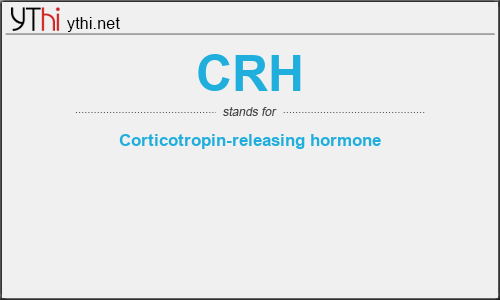What does CRH mean? What is the full form of CRH?
The Full Form of CRH is Corticotropin-releasing hormone.
Corticotropin-releasing hormone (CRH; previously known as corticotropin-releasing factor) is the central regulator of the hypothalamic-pituitary-adrenal (HPA) axis, which is the main organizer of the body’s response to stress.1–5 Stress induces the hypothalamic production and release of CRH, which then causes the activation of the CRH receptor (CRHR) type 1 (CRHR-1) in the anterior pituitary to stimulate ACTH release, as well as proopiomelanocortin (POMC) expression and processing. ACTH stimulates the production and secretion of cortisol (humans) or corticosterone (rodents) by the adrenal cortex. These steroids regulate the body’s response to counteract effects of the stressor and suppress the HPA through the negative feedback mechanism. CRH/POMC expression can also be activated by the cytokines interleukin (IL)-1, IL-6 and tumour necrosis factor (TNF)-α, thus involving the immune system in the central regulation of the HPA axis. In addition, CRH together with related urocortin (URC) peptides regulate behavioural, autonomic, endocrine, reproductive, cardiovascular, gastrointestinal and metabolic functions both on the central and on the peripheral levels, and CRH has immunosuppressive effects via the HPA. It is also accepted that peripheral CRH and related peptides have predominantly proinflammatory functions, and in this way differ from their central immunosuppressive activity. However, recent data also suggest that the peripheral CRH may have dual effects: a direct, short-term proinflammatory function and an indirect, remote anti-inflammatory function
CRH
means
Corticotropin-releasing hormone![]()
Translate Corticotropin-releasing hormone to other language.


Leave a Reply
You must be logged in to post a comment.